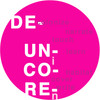de_colonialanguage: Languages Speaks by Us, We See It and Can Make It Visible
The de_colonialanguage collective was founded in April 2023 with the intention of artistic research into colonial language and the creation of decolonial spaces. The languages for researching and discussing colonial situations, postcolonial conditions (if they exist) and decolonial processes in different parts of the world are diverse and have different periods of evolution. In the Latin American region, the language has been evolving for more than 100 years and has its own specificities. The countries of the Caribbean Islands have endowed many of the most important decolonial voices. Researchers and artists from Africa, Asia, and North America have made a huge contribution. A great archive has already been accumulated.
Russian-Soviet-Russian Imperial Perennialism
Of the variety of empires, we focus on the Russian-Soviet empire. We use this term because, for us, the continuity of colonial relations and mechanics is evident between these political structures — the transition of colonial possessions and relations from the Russian Empire to the Soviet Union and then to the Russian Federation took place in such a way that the relations of the oppressed and the oppressor were sustained. It is also evident that while Russian political ideology constructs a narrative of being "rejected by the West", it is in fact part of the West and, in terms of decolonial theories and practices, is deeply embedded in Western mechanisms of power capture and protection as an active violent actor rather than an oppressed one.
This gives us a platform to interrogate hidden colonialism that is able to critically view colonial mechanics but is unable to critically recognize itself as part of such processes.
This kind of hidden colonialism seeks the invisibility of violent power relations, yet is unable to hide it. Beneath the false facades of such power efforts, structures of violence, extractivism, xenophobia, and a variety of other discriminatory mechanics in favor of the metropole are always visible. And one of the problems in this space is the language of discourse on coloniality and decoloniality. The existing archives of decolonial studies are very helpful, but cannot fully provide us with a language for the study of Russian-Soviet colonialism, nor can they fully identify decolonial processes in countries that were or are under the influence of this empire. This language is already being created by the decolonial subjects themselves, taking into account their specificities — people from Central Asia, Eastern Europe, the indigenous peoples of the colonized part of Russia, and the countries of the North and South Caucasus. The experience of relations with Russian-Soviet imperialism in Finland, Afghanistan, and Syria is also undoubtedly important here.
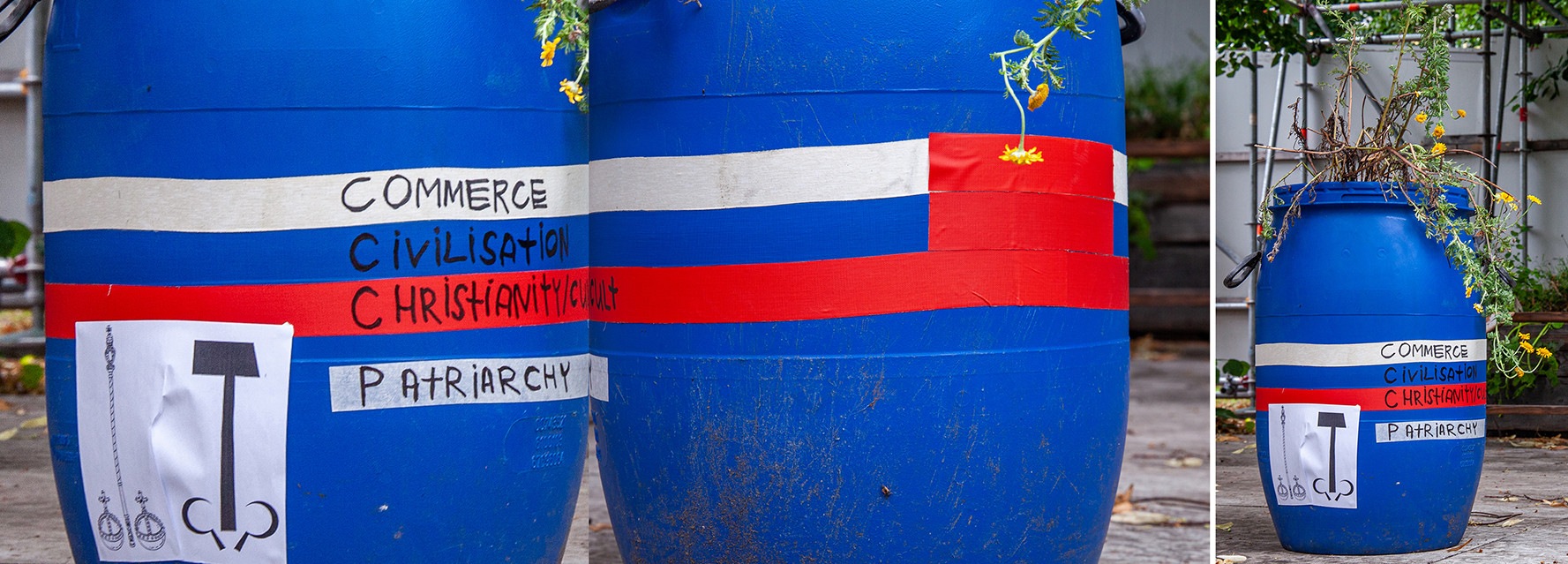
In June and July 2023, we held 2 exhibitions at Haus der Statistik (Ubuntus space) in Berlin with artists from Georgia, Brazil, Adyghe, Germany, Kalmykia, Kyrgyzstan, Mexico, Tatarstan, Russia, and Tunisia. It was the usual gallery format. Not as a gallery-store, but as a gallery research space. At these two exhibitions, we discussed how the phenomenon of "post-Soviet" appeared and how ethical it is to use this term. There was an opinion that this generalization continues the violence of Moscow’s centralized metropole and that it is necessary to get rid of its use. One of the discussion participants suggested adding creative energy to the negative tone of the term by adding the suffix "com":
compostsoviet
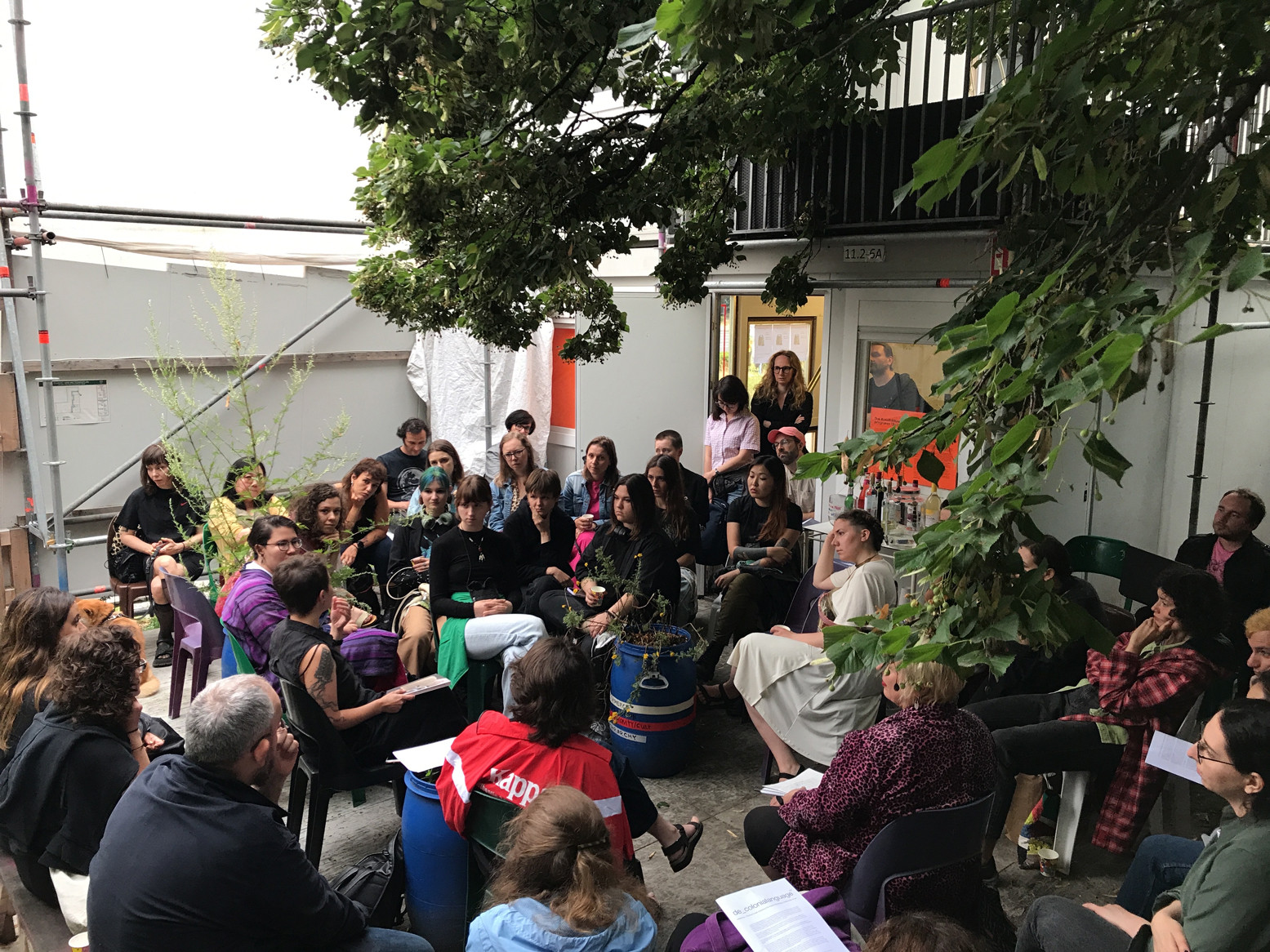
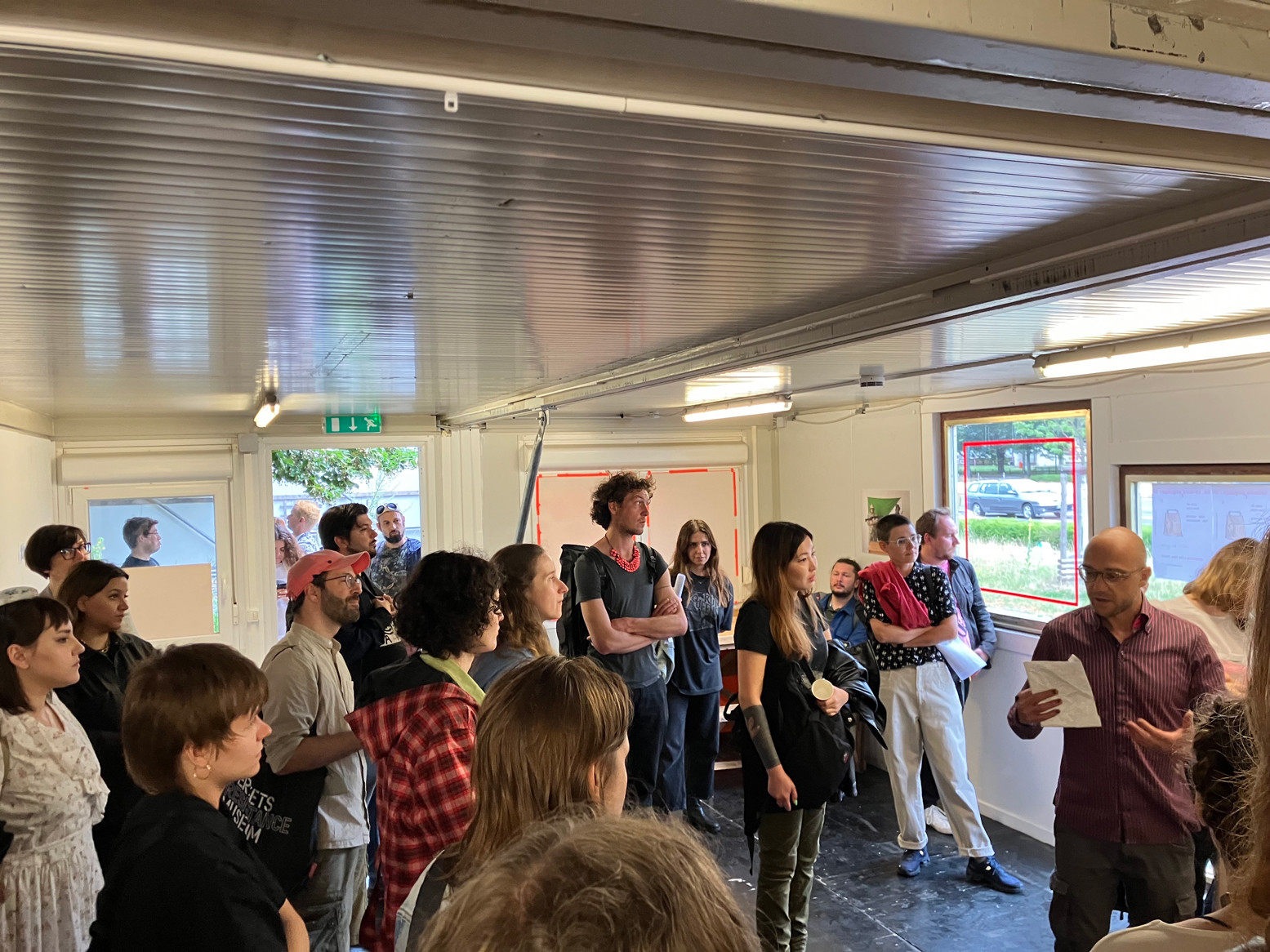
In the second exhibition in July, we explored the subject of whiteness as a power structure. Shades of whiteness in the context of colonized subjectivities by the Russian empire with the experience of oppressed Others from different parts of the world. It is an incredibly complex and profound topic, but it is nevertheless important to explore and reveal it. One of the directions was prompted by James Baldwin’s text "The world is not white. It can’t be, whiteness is just a metaphor for power". We will come back to this theme later when we read Frantz Fanon. After organizing these two exhibitions, we decided to move our work into a public open space.
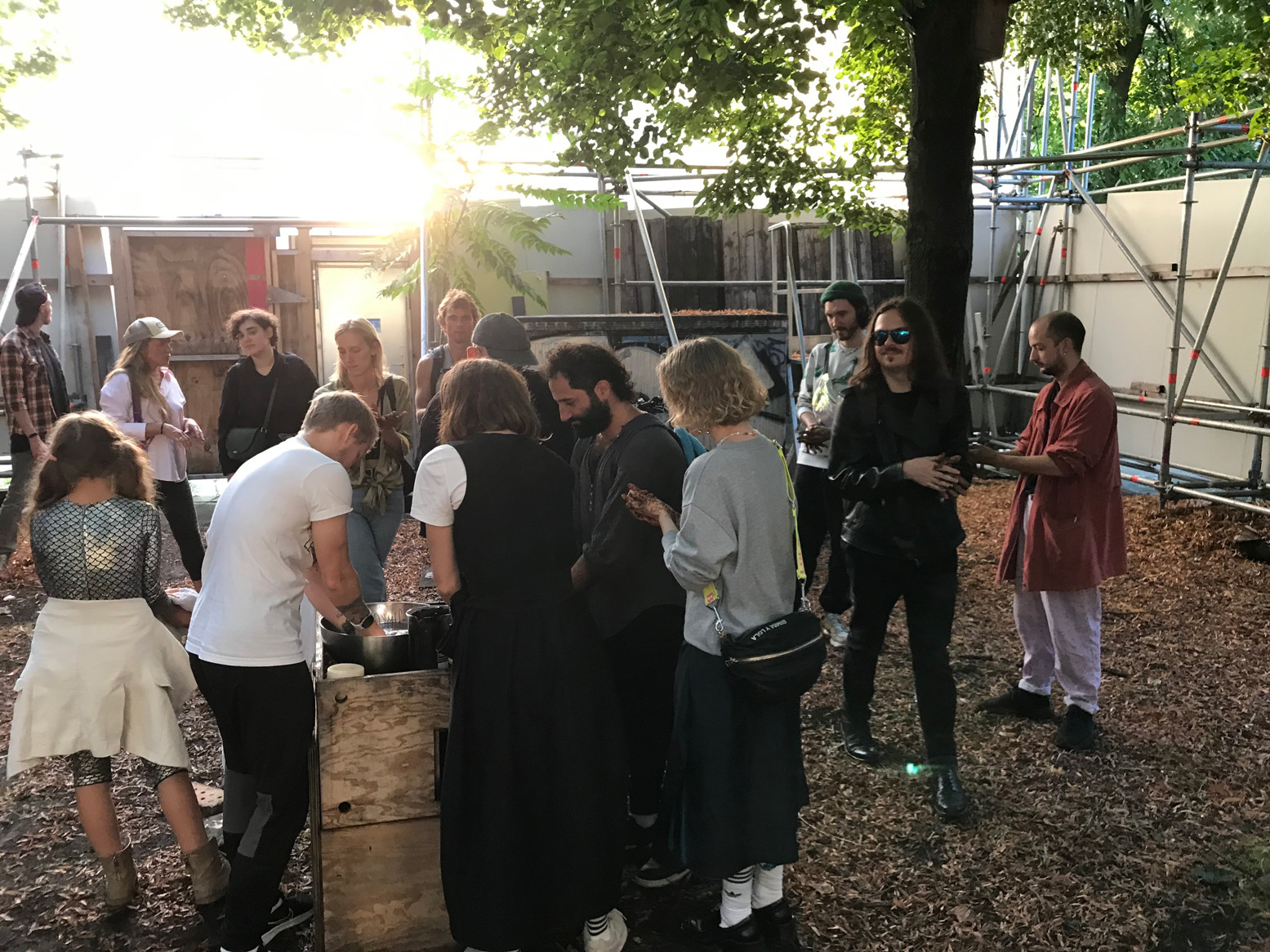
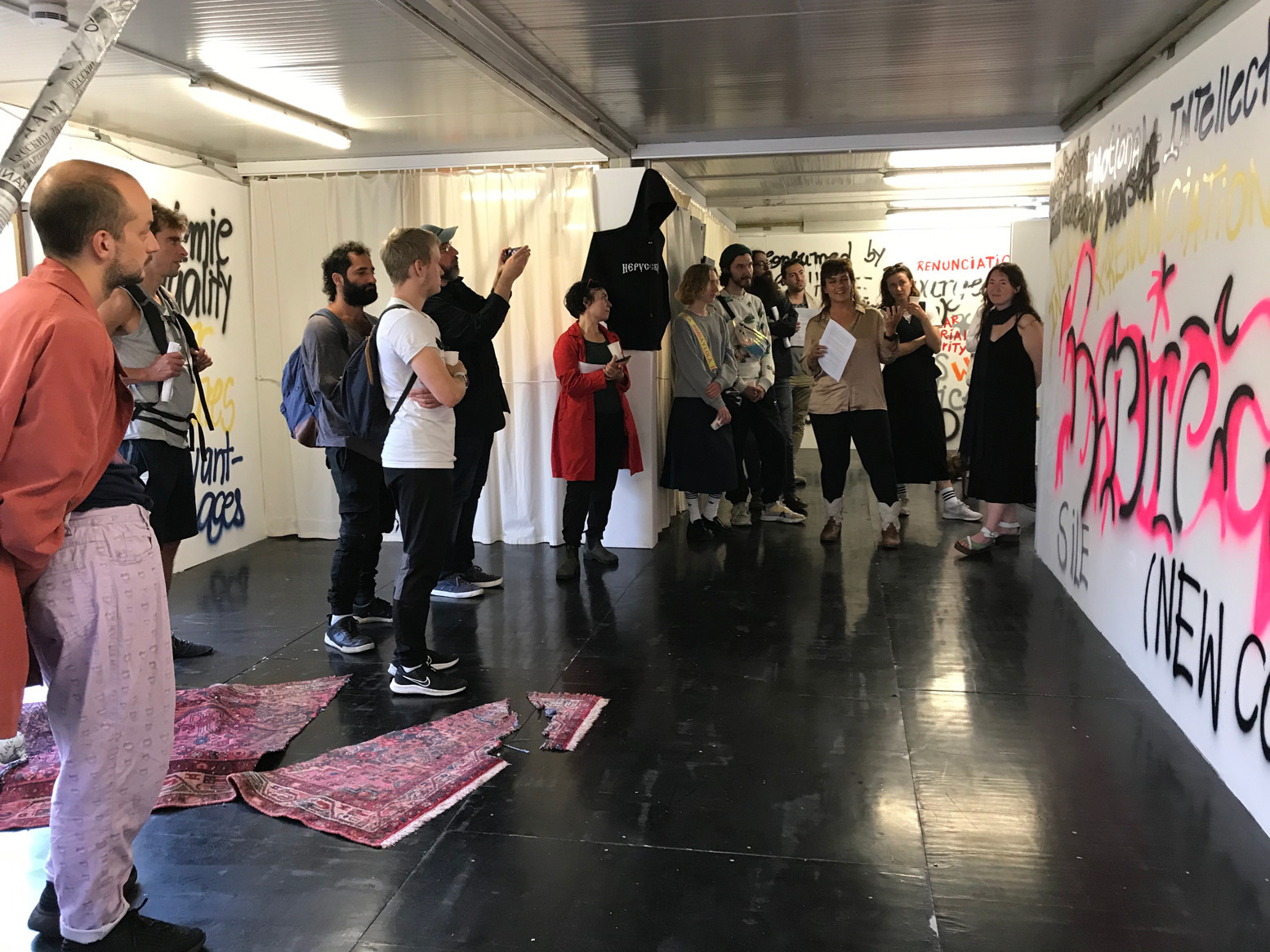
The Open Air Museum of Decoloniality
The Open Air Museum of Decoloniality was opened in September 2023 at Alexanderplatz in Berlin. This square is named after Alexander I, a successful colonizer and Russian emperor. We talked more about his colonial conquests in NOT A SINGLE STORY or Why Decoloniality Matters and How We Can Make It Visible. Shock and confusion are only part of the emotional landscape from realizing the fact, that one of the largest squares of Europe in the middle of Berlin bears the name of Russian Imperialism. It seems important to us to emphasize and highlight the complexity of colonial relations right now when the Russian empire is simultaneously conducting several colonial wars, creating a ring of proxy wars all along its borders, and continuing to forcibly Russify a multi-ethnic population inside Russia’s current borders — and yet one of the largest squares of Europe in the middle of Berlin bears the name of Russian Imperialism. What’s that? Yes, it’s ridiculous, it’s scary, we want to draw attention to such issues.
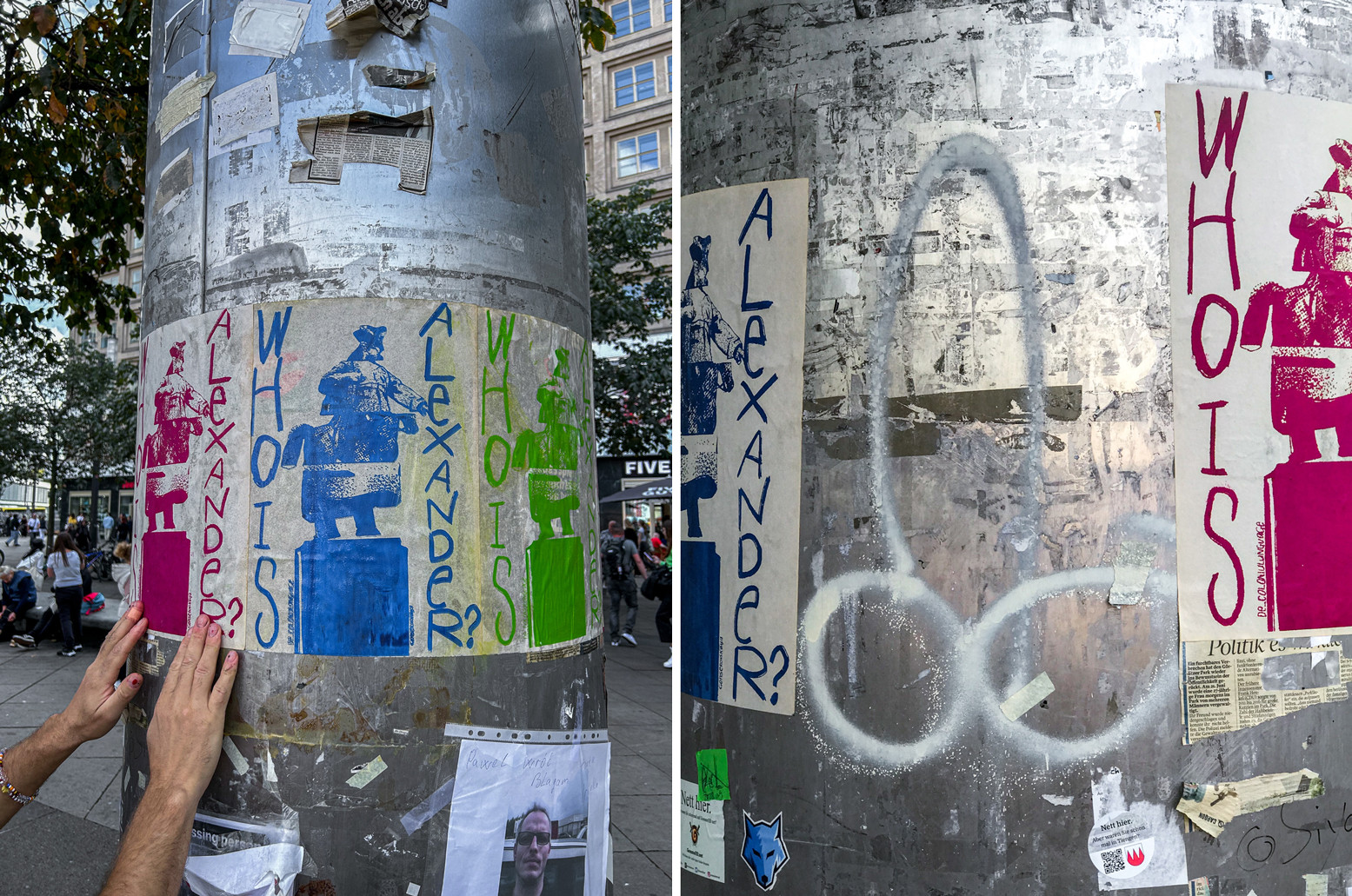
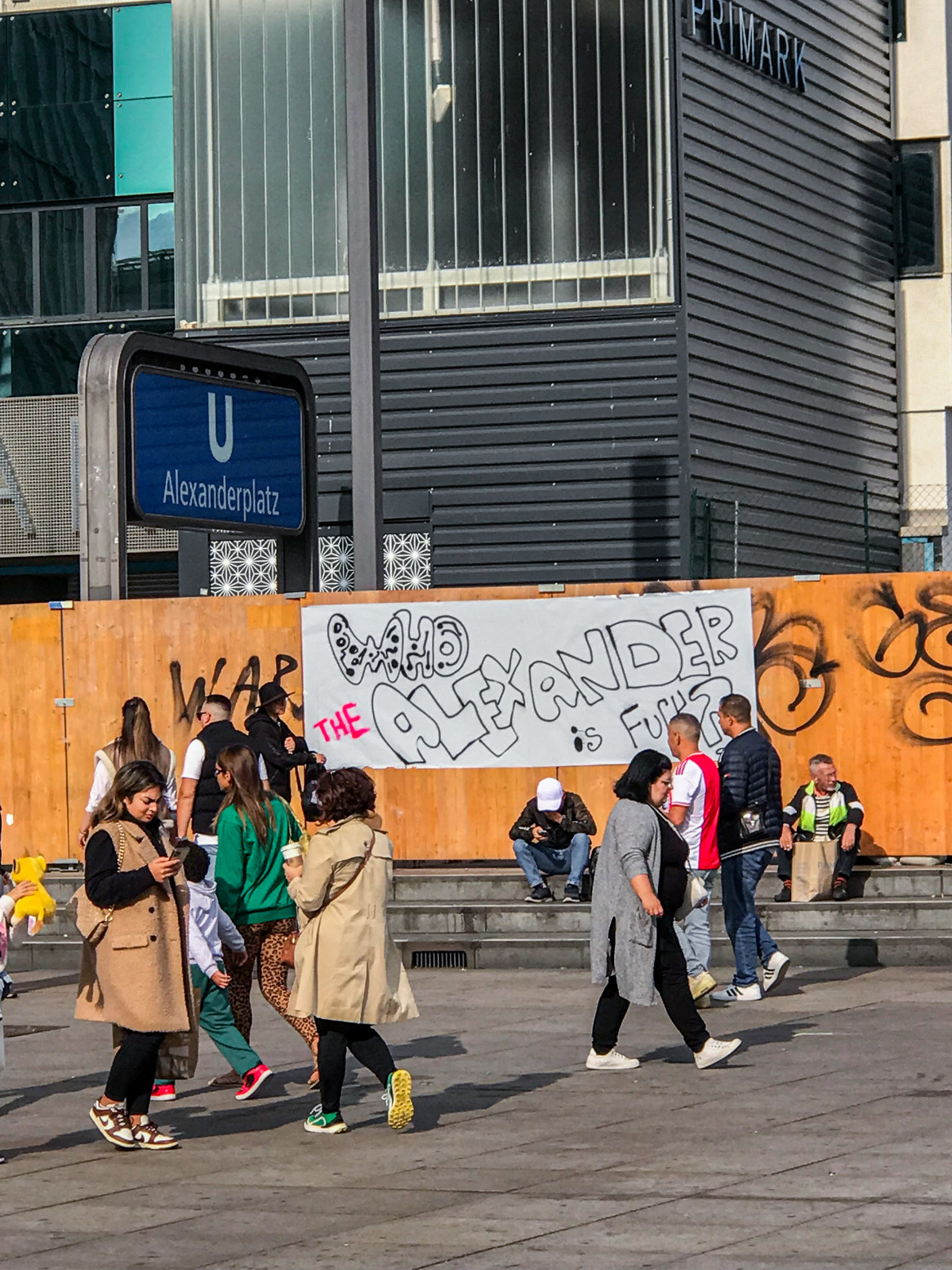
Afterward, we had a walking tour-lecture at the Open Air Museum of Decoloniality. We focused on the theme "NOT A SINGLE STORY", which was inspired by the idea of researching decolonial feminist names and resonated with many of the participants. The tour highlights the significance of decolonial processes, makes visible feminist names in public spaces and challenges traditional narratives. We intend to update the museum’s exhibition based on the feedback and ideas of the participants and are sincerely committed to promoting diverse perspectives and commemorating of those who fought for freedom, solidarity and justice.
This gesture allowed us to expand the field of critical work. Museology and the space of Alexanderplatz were added to the theme of decoloniality. In the moment when the act of declaring the open space of the town square a Museum took place, in that moment all the objects of the square became cultural objects, archives, and media, and all passers-by became visitors to the Museum. In the Open Air Museum of Decoloniality, there is a monument to progress and mechanical time — Weltzeituhr (World Clock), there is a fountain of Friendship of Nations (Brunnen der Völkerfreundschaft), there are stores, coffee houses, a police post, a line of streetcars, construction of skyscrapers on Russian and French money. The museum’s collection is extensive, but we try to add new objects all the time: Other Names Pole, Home-Mother-Father-Land Wall, tOgeTHER Pole, Decolonial Feminist Names, Home Skin map, The Path of the Sun or the
Bare Life manifesto etc. We also organize regular plenums, workshops, lectures, and guided tours in this Museum.
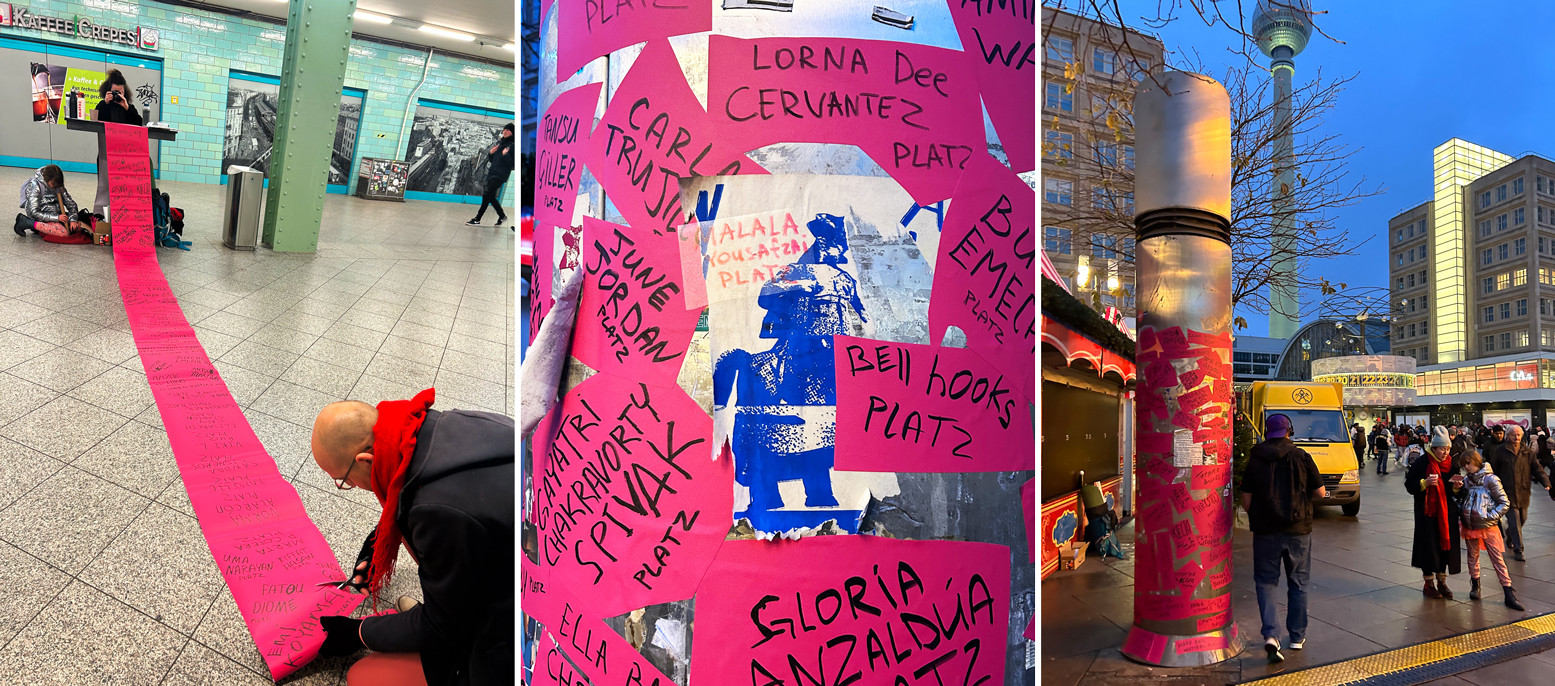
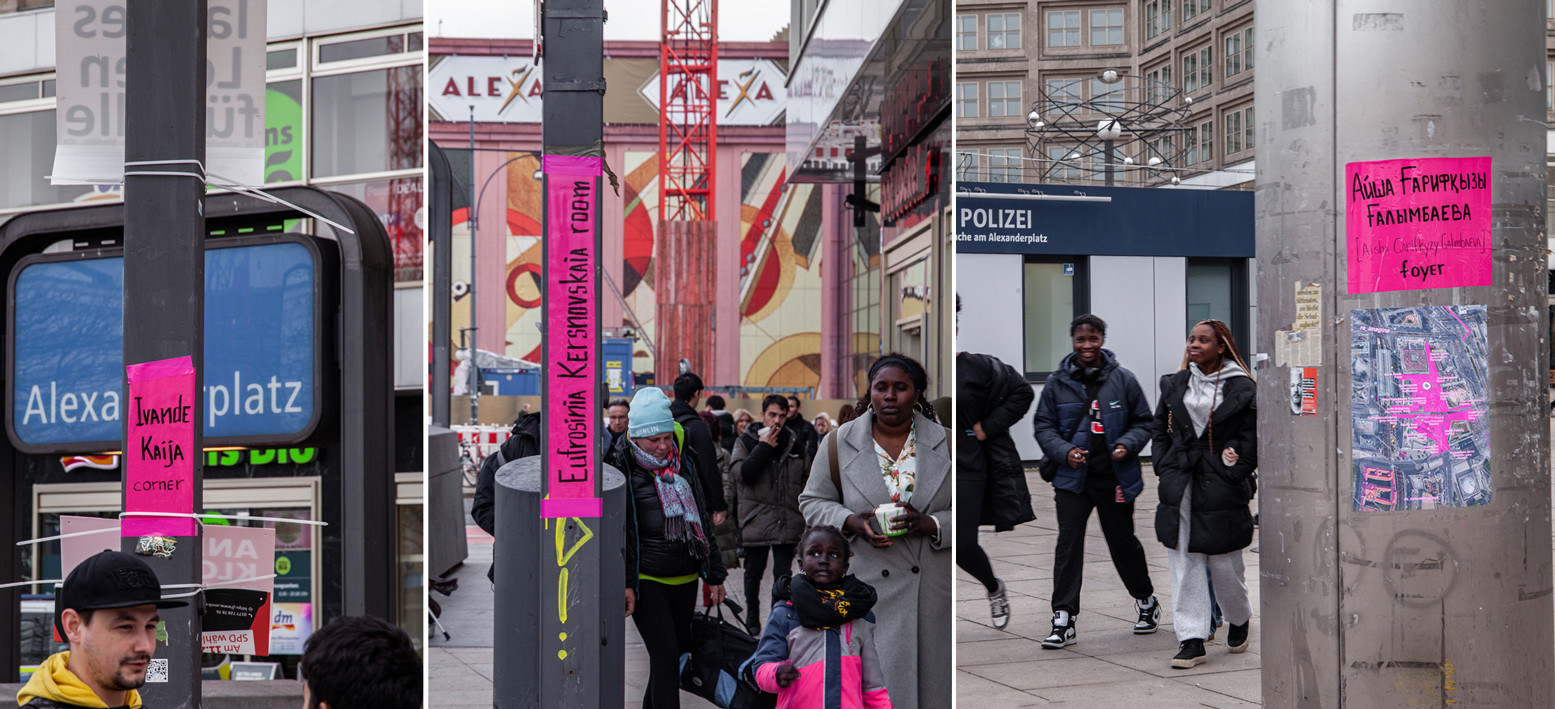
Decoloniality, Critical Museology and Particular Public Space in the City
We learned that this is not just a touristy agitational Soviet square, but a space for very different groups of people. A large community of homeless people live here and they actively share their stories. Several different communities of promoters have street battles for poster spaces. Teenagers from the nearby Soviet-era panel houses spend their evenings here. At the central fence around the construction site is a street-art-fence curator (!) who invites artists to artwash the construction site and fights with street artists due to ugly gentrification. Her project is titled Afence, or offense or (a)sense..... People who put on a show in mascot costumes often expect to capture attention to the point where the audience doesn’t notice the missing wallet. And there are plenty of other musicians and dancers who occupy the space on evenings and weekends. The creation of the Open Air Museum of Decoloniality turns these diverse residents of the square into museum visitors for the duration of the event.
The police here 24/7 not only make sure of no criminals there but also that the monuments and infrastructure protected by the city are not spoiled or misused. For example, celebrating a birthday in the square is ok, but a political demonstration can only be held after it has been authorized. In December 2023, we critically reconsidered the mechanical Weltzeituhr (World Clock) as a symbol of progress, one of the mechanics of justifying colonial violence, and a dystopia of linear time. We wanted to connect Time and Power with the help of installation in such a way that critical reflection would open the possibility of a different imagination of Time. We only had time to string 3 pink threads around the monument and that was enough for the Museum’s security guards — the police officers — to take over the whole work. Time and Power were joined literally. Such a literalism we didn’t really want, but that’s how participatory art is — the author is dead and the police officers are also contributing to the discussions today too much. Space and time belong to power, it’s their infrastructure. And we should do more to reclaim Time, Space, and Dignity.
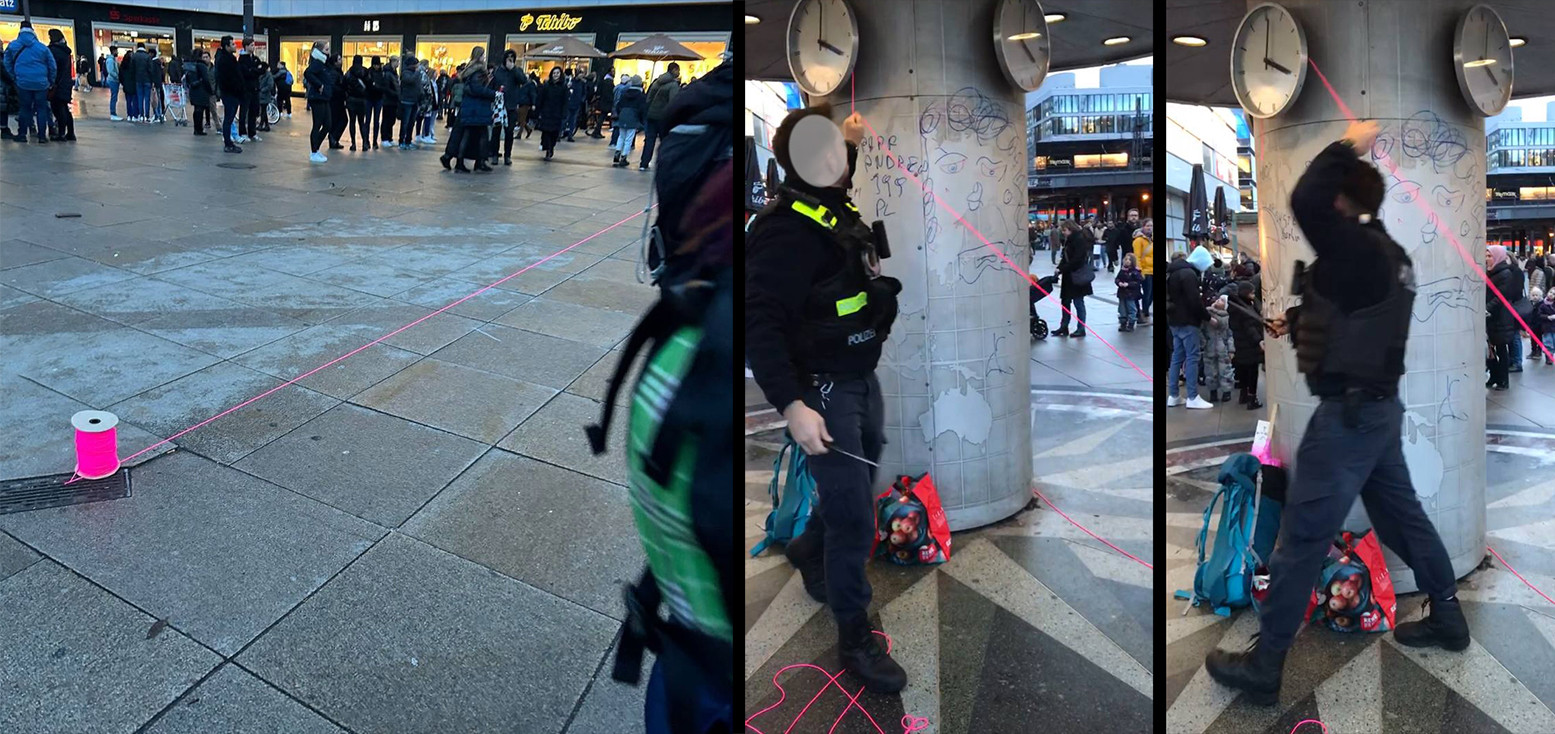
At the moment, the de_colonialanguage collective and the Open Air Museum of Decoloniality are working on the following directions:
Art Interventions: We do at least one action every month, creating spaces of decoloniality and solidarity, exploring the space of the square, and critiquing the institutionalization of the museum. We announce all events in advance on our Instagram account @de_colonialanguage.
Reading and Discussing: We have also started an online school Nearby Reading Room and every month we read and discuss texts nearby related to decoloniality. We have already read and nearby-discussed texts by Édouard Glissant, Sarah Cameron, Frantz Fanon. We are now reading Gloria Anzaldúa’s book.
(Self-)Publishing and Writing: We are developing the theme of the Other Archive and accumulating publications and critical texts. Oppressive systems always try to eliminate alternative testimonies, so work on documentation and (self-)archiving, practices of self-recording and self-ethnography are valid decolonial practices. We believe that personal positionality is important because a personal story almost never fits mainstream narratives (See: Eyes Like These // NACRE JOURNAL). We are open to other authors publishing their texts (poetry, research, fiction, and non-fiction stories) related to decoloniality.
Participatory Pedagogy: We are making participatory education practices, inviting academics, theorists, think-tankers, artists, scholars, researchers, and cultural workers to dialogue. We are involved in various discourses From Feminist Theory and Feminist Foreign Policy to intersectional decolonial policy. So far we cohosted and given a workshop "Feminist Research & Decolonizing Knowledge" as part of the European Think Tank Conference | DGAP (German Council on Foreign Relations) in mid-October 2023 and we are engaging in the area of art and critical thinking and posing public questions about decoloniality and queer/feminist studies.
Building Networks: We create spaces for decolonial relations. The participants in our collective are from different contexts and spaces, but what we have in common is the concept of relations research and the exploration of decoloniality. One of the main focus of the project is to explore Russian-Soviet imperialism and the space of dignity suppressed by Russian-Soviet colonialism. An equal part of the project is the research of Latin American and Caribbean decoloniality and creating a space of exchange and solidarity in between. We made a research trip on decolonial discourses in Central Asia in August 2023, and we are continuing to ask, how the (post)-imperialistic foreign policy of Russia/Soviet Union is impacting this region and how we can connect it with feminist and decolonial discourses in Berlin and in other parts of the world.
Laboratory: In the near future we have plans to open a workshop space in Berlin, where we are happy to share our resources and invite everyone to collaborate, co-think, and co-produce statements, archives, and actions together.
We are open to many ideas and new collaborations. If you would like to support us or offer a joint activity, project, or idea, or just to be in contact, or join the Nearby Reading Room contact us via de.colonialanguage@gmail.com or @de_colonialanguage on Instagram.
